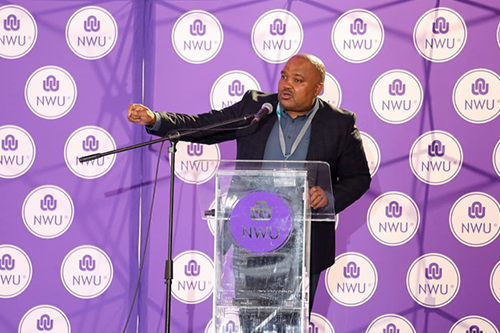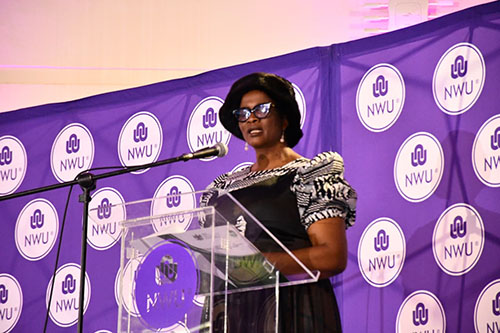In what has been dubbed an “accountability forum”, where pressing questions were asked about the future of South Africa, the North-West University (NWU) hosted the Youth 20 (Y20) Postgraduate Day at its Mahikeng Campus on 19 August.
The gathering was part of the NWU’s biennial Research and Innovation Week, which this year was aligned with South Africa’s presidency of the Group of 20 (G20) and emphasises solidarity, equality and sustainability.
Government leaders, academics, industry partners and postgraduate scholars used the opportunity to deliberate on the role of transformative and transdisciplinary research in building sustainable futures.
The theme of the event was “Transdisciplinary and transformative research: building sustainable futures”.
Three critical questions
In his welcome address, NWU principal and vice-chancellor Prof Bismark Tyobeka, said the day was designed as an accountability forum to ask three critical questions. These are whether the country is on track to meet Sustainable Development Goal (SDG) 4 on quality education; whether transformative research can address African sustainability challenges; and whether postgraduate qualifications secure a sustainable future for youth.
Prof Tyobeka noted South Africa’s progress in expanding access to education, citing improved school participation rates and the number of tertiary graduates.
However, he warned that structural inequalities persist.
“The starkest measure of our progress is found in the labour market,” he said, highlighting Statistics South Africa’s finding that youth unemployment remains at alarming levels, with 62,2% of 15 to 24-year-olds unemployed in the second quarter of 2025.
He further cautioned that graduate unemployment is also rising, calling for stronger alignment between postgraduate education and labour-market needs. “If postgraduate education is to be meaningful, it must deliver on three imperatives: access and affordability, skills and relevance, and equity,” he stressed.
Knowledge cannot be confined to academia
Representing the Premier of the North West Province, MEC for Economic Development, Environment, Conservation and Tourism, Bitsa Lenkopane spoke about the urgent need for knowledge that does not remain confined to academic spaces, but that actively shapes the society we aspire to build.
She highlighted the province’s strengths and opportunities. “As the Platinum Province, we are blessed with vast mineral wealth, agricultural strength, vibrant cultural heritage and a strategic geographic position that connects us to the rest of the country and the continent. Hosting an event of this calibre at the NWU affirms our commitment to harnessing these strengths to drive both provincial and national transformation.”
The programme featured panel discussions on whether South Africa is meeting SDG 4 targets on access to affordable education, skills for financial success and eliminating discrimination in education, as well as whether postgraduate research can practically contribute to African sustainability.
Postgraduate students participated in debates with higher education leaders, discussing whether research qualifications guarantee a sustainable future for South Africa’s youth.
Prof Tyobeka reaffirmed the NWU’s commitment to mission-led research on climate change, renewable energy, food and water security, and social justice. He emphasised the importance of embedding mentorship and employability into postgraduate training. “The future must be shaped by those who will inherit it,” he said. “That is why this day matters.”

NWU principal and vice-chancellor Prof Bismark Tyobeka

MEC for Economic Development, Environment, Conservation and Tourism, Bitsa Lenkopane
